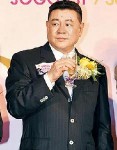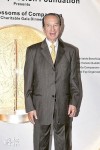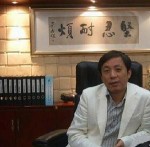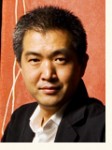The Collectors in China
The chairman of Chinese Estates, a property developer, one of Hong Kong’s richest men, Joseph Lau is nicknamed a “stock market sniper” for his talent in profiting from the trading of undervalued shares. Apart from business, the flamboyant tycoon’s lavish lifestyle and relationships with different women. appear regularly in the city’s tabloids.
Outside Hong Kong, however, he is perhaps best known as an avid art collector, whose tastes have ranged from Chinese antiques to modern paintings through the years.
Armed with a science degree from the University of Windsor in Canada, Lau inherited a fan-making business from his father in the 1970s, then branched out into trading.
He started collecting more than 30 years ago: one of his first reported purchases at an international auction dated back to 1990, when he paid less than $1m for an imperial seal mark from the Qianlong period of the Qing dynasty and a doucai jardinière at Christie’s.
Last year, Lau bought a 7.03-carat blue diamond for $9.48m at Sotheby’s Geneva. More recently, he was one of the eight bidders for “Nude, Green Leaves and Bust”, the 1932 Picasso that sold at auction this month for $106.5m.
Whether he eventually took the masterpiece home remains a mystery: neither Christie’s nor Chinese Estates would comment.
In the lobby of the Grand Lisboa stands a bust of Stanley Ho, the gaming mogul and majority owner of the Macao casino. Behind him lies a bronze horse-head sculpture he bought for a record $8.8m in 2007. The work – the most expensive Qing dynasty sculpture sold at auction – is one of the 12 heads of zodiac animals which graced a water-clock fountain in Yuanmingyuan, the imperial summer palace near Beijing, that was looted in the 19th century.
When Ho bought the sculpture through Sotheby’s Hong Kong, the avid racehorse owner donated it to China. It is on temporary display in the Grand Lisboa while Ho decides which government department to give it to.
“I hope this will encourage more people to join efforts in preserving China’s cultural relics and nurture patriotic feelings,” Ho, 88, said at that time.
Ho seems to think that no price is too high to buy back China’s history.
In 2003, he snapped up the clock’s boar head and gave it to Beijing’s state-backed Poly art museum, which also has the monkey, ox and tiger heads.
In 2007, Ho bought an imperial throne of the Qing dynasty for $1.8m. His other collections of Chinese works of art include a mammoth tusk carving of the Monkey King, one of the country’s best-known legendary figures, and an imperial, gem-engraved clock from the Qing period that imitates the sound of birds.
When it comes to art collectors, Shanghai businessman Liu Yiqian and his wife Wang Wei are among the most famous in China. Driven by Liu’s rule of collecting – “one should buy shares that are cheap and art pieces that are expensive” – the couple spent an estimated Rmb1.3bn (£116m) last year on buying art, including “18 Arhats”, a 16th-century scroll painting by Ming dynasty painter Wu Bin that was sold for Rmb169m, the highest price for any Chinese artwork in auction. It was “my most memorable purchase”, according to Liu. In Hong Kong, they also set a record for Chinese furniture after paying HK$85.7m for a zitan imperial throne from the Qing dynasty through Sotheby’s in October.
Liu, a high school dropout now in his 40s, started a company making bags with Rmb100 in the 1980s. As China began to open up its financial markets in the 1990s, he gave up the business and went into bonds and shares trading. That helped him become a millionaire and build the war chest to fund his newfound interest in collecting art, mainly classical paintings and antiques.
Wang got interested in art at a very young age when she realised her talents in drawing. She started collecting in the 1990s, and is fond of oil paintings and sculptures, especially “red classics” – art pieces that symbolise China’s turbulent decades after 1949.
Guan Yi is China’s most influential collector of contemporary art. Born to a middle-class family that runs a chemical manufacturing company in Qingdao in north-east China, Guan left the family business in 2001 to become a full-time collector. One of the first buyers of Chinese contemporary art on the mainland, he started snapping up many modern paintings, sculptures and installations before they became global phenomena.
“After I started, I realised that no Chinese was buying contemporary art and that everything was going abroad. I thought this was not right. This art of our time is important and we Chinese should buy more of it,” Guan, 44, says.
Guan has now acquired about 800 such works. In spite of that, he is not happy with the soaring prices of Chinese artists. He says contemporary art has become such a commercial product that people are buying it as if it was stock.
This is, he says, especially true among Chinese collectors, who buy four out of five works now. Ten years ago, only one in five buyers was Chinese. “This is clearly a very capitalistic approach. There is no religion in China. Capitalism is god now,” says Guan.
He is now seeking government approval to build a museum that would be 10 times bigger than his current private museum in Songzhuang, a popular art district in the east of Beijing.
Profiles by Justine Lau
Song Meiling: the Lady Who Loves Power
Song Mei ling was one of the three Song sisters and described as “the one who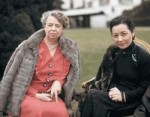 loved power”. As the wife of Chiang Kai-shek, she was also known as Madame Chiang Kai-shek and played a prominent role in the politics of the Republic of China.
loved power”. As the wife of Chiang Kai-shek, she was also known as Madame Chiang Kai-shek and played a prominent role in the politics of the Republic of China.
The fourth of six children, she was born in Shanghai to Charlie Song, a Methodist minister and businessman who made a fortune selling bibles in China. Meiling attended Motyeire School, an American private school, in Shanghai at the age of eight. She started college at her sisters’ alma mater, Wesleyan College in Macon, Georgia, but transferred to Wellesley College and graduated with honors in 1917 with a major in English literature and minor in philosophy. As a result of being educated in the United States she spoke excellent English with a pronounced Georgian accent which helped her to connect with American audiences.
Song Meiling met Chiang Kai-shek in 1920. Since he was eleven years her elder, already married, and a Buddhist, Meiling’s mother vehemently opposed the marriage between the two, but finally agreed after Chiang showed proof of his divorce and promised to convert to Christianity. Chiang told his future mother-in-law that he couldn’t convert immediately, because religion needed to be gradually absorbed, not swallowed like a pill. While some biographers regard the marriage as one of the greatest love matches of all time, others describe it as a marriage of convenience. The couple never had any children.
Madame Chiang initiated the New Life Movement and became actively engaged in Chinese politics. She was a member of the Legislative Yuan from 1930 to 1932 and Secretary-General of the Chinese Aeronautical Affairs Commission from 1936 to 1938. In 1945 she became a member of the Central Executive Committee of the Kuomintang. As her husband rose to become Generalissimo and leader of the Kuomintang, Madame Chiang acted as his English translator, secretary and advisor. During World War II, Madame Chiang tried to promote the Chinese cause and build a legacy for her husband on par with Roosevelt, Churchill and Stalin. Well versed in both Chinese and western culture, she became popular both in China and abroad. Her prominence led Joseph Stilwell to quip that she be appointed minister of defense.
In the United States, she drew crowds up to 30,000 people and made the front cover of TIME magazine, first with her husband as “Man and Wife of the Year” and second under the title “Dragon Lady.” On February 18, 1943, she became the first Chinese national and second woman to address the U.S. Congress.
After the defeat of her husband’s government in the Chinese Civil War in 1949, Madame Chiang followed her husband to Taiwan, while her sister Song Ching-ling stayed on the mainland, siding with the communists. Madame Chiang continued to play a prominent international role. She was a Patron of the International Red Cross Committee, honorary chair of the British United Aid to China Fund, and First Honorary Member of the Bill of Rights Commemorative Society. Through the late 1960s she was included among America’s 10 most admired women.
After the death of her husband in 1975, Madame Chiang assumed a low profile. Chiang Kai-shek was succeeded to power by his eldest son Chiang Ching-kuo, from a previous marriage, with whom Madame Chiang had rocky relations. In 1975, she emigrated from Taiwan to her family’s 36 acre (146,000 m²) estate in Lattingtown, Long Island, where she kept a portrait of her late husband in full military regalia in her living room.
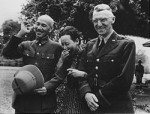 Madame Chiang returned to Taiwan upon Chiang Ching-kuo’s death in 1988, to shore up support among her old allies. However, Chiang’s successor as president, Lee Teng-hui, proved to be more adept at politics than she was, and consolidated his position. As a result, she again returned to the U.S.
Madame Chiang returned to Taiwan upon Chiang Ching-kuo’s death in 1988, to shore up support among her old allies. However, Chiang’s successor as president, Lee Teng-hui, proved to be more adept at politics than she was, and consolidated his position. As a result, she again returned to the U.S.
Madame Chiang made a rare public appearance in 1995 when she attended a reception held on Capitol Hill in her honor in connection with celebrations of the 50th anniversary of the end of World War II. Madame Chiang also made her last visit to Taiwan in 1995.
In the 2000 Presidential Election on Taiwan, the Kuomintang produced a letter from her in which she purportedly supported the KMT candidate Lien Chan over independent candidate James Song (no relation). The authenticity of the letter was the subject of great debate in Taiwan. (However, it should be noted that James Song himself had never disputed the authenticity of the letter, which might have been written as a payback for James Song’s veiled criticism of her earlier, in support of Lee.)
Song sold her Long Island estate in 2000 and spent the rest of her life in her Gracie Square apartment surrounded only by black-suited bodyguards who cleared the lobby as she passed.
Song died in New York City, in her Manhattan apartment in 2003 at the age of 105 or 106. Her remains were temporarily interred at Ferncliff Cemetery in Hartsdale, New York, pending an eventual burial with her late husband who was entombed in Tzuhu, Taiwan. The stated intention is to have them both buried in mainland China once political conditions make it possible.
Hunan’s 16 Intangible Cultural Heritage Items to Perform in Beijing in March
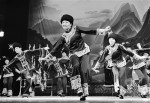 intangible cultural heritage items, the reporting performance themed with “Hunan Flavor” was conducted at the Hunan Concert Hall on the evening of March 13. It is reported that Hunan’s 16 ethnic intangible cultural heritage items will be performed in the Beijing Tianqiao Theater on 17 and 18 this month.
intangible cultural heritage items, the reporting performance themed with “Hunan Flavor” was conducted at the Hunan Concert Hall on the evening of March 13. It is reported that Hunan’s 16 ethnic intangible cultural heritage items will be performed in the Beijing Tianqiao Theater on 17 and 18 this month.
Sponsored by the Ministry of Culture and the Ethnic and Religious Affairs Commission, this performance activity was held in Beijing on February 17 and will last until March 30. The ethnic folk artists from different provinces, cities, and autonomous regions across the country will present nine performances for the local audience. Among them, special performances will be made by Hunan, Qinghai, Sichuan and Guizhou provinces, and Tibet, Inner Mongolia and Guangxi Zhuang autonomous regions.
Nearly 200 Hunan-based actors from Xiangxi, Huaihua, Zhangjiajie, Shaoyang, and Yongzhou attended the performance, including Tian Longxin and Dai Bisheng, and Chen Shida, representative heirs of the state-level and provincial-level intangible cultural heritage respectively. The performance displays the colorful folk culture of Hunan’s ethnic minorities with their dances, instrumental music, folk songs, clothing, and so on.
Translator: Lv Xuefen
Song Qingling: the Lady Who Loves China
Song Qingling (January 27, 1892 – May 29, 1981) was one of the Song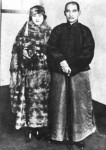 sisters—three sisters whose husbands were amongst China’s most significant political figures of the early 20th century. Also known as Madame Sun Yat-sen, she was described as the “one who loved China”. Her Christian name was Rosamond.
sisters—three sisters whose husbands were amongst China’s most significant political figures of the early 20th century. Also known as Madame Sun Yat-sen, she was described as the “one who loved China”. Her Christian name was Rosamond.
She was born to the wealthy businessman and missionary Charlie Song in Kunshan, Jiangsu, attended Motyeire School for Girls in Shanghai, and graduated from Wesleyan College in Macon, Georgia, United States.
She married Sun Yat-sen in Japan on October 25, 1915 after he divorced Lu Muzhen. Qingling’s parents greatly opposed the marriage, as Dr. Sun was 26 years her senior. After Sun’s death in 1925, she was elected to the Kuomintang (KMT) Central Executive Committee in 1926. However, she exiled herself to Moscow after the expulsion of the Communists from the KMT in 1927.
Although she reconciled with the KMT during the Sino-Japanese War (1937-1945), she sided with the Communists in the Chinese Civil War. She did not join the party but rather was part of the united front heading up the Revolutionary Committee of the Kuomintang.
Song Qingling accompanied Sun Yat-sen in 1924 on his final trip to Beijing in 1939. She founded the China Welfare Institute (former China Defense League) in Hong Kong.
She set up the magazine China Today (former China Reconstructs) in 1949 with the help of Israel Epstein. This magazine is published monthly in 6 languages (Chinese, English, French, German, Arabic and Spanish).
After the establishment of the People’s Republic of China, she became the Vice Chair of the People’s Republic of China (now translated as “Vice President”), Head of the Sino-Soviet Friendship Association and Honorary President of the All-China Women’s Federation. In 1951 she was awarded the Stalin Peace Prize, and in 1953 a collection of her writings, Struggle for New China, was published. From 1968 to 1972 she acted jointly with Dong Biwu as head of state.
According to Jung Chang’s and Jon Halliday’s biography of Song Qingling, Madame Sun’s home was one of the few places if not the only place to offer macaroni and cheese in Communist China during its isolation from the 1950s to 70s.
On May 16, 1981, two weeks before her death, she was admitted to the Communist Party and was named Honorary President of the People’s Republic of China.
Unlike her younger sister Song Meiling, who sided with her husband Chiang Kai-shek and fled to Taiwan, Song Qingling is greatly revered in mainland China.
